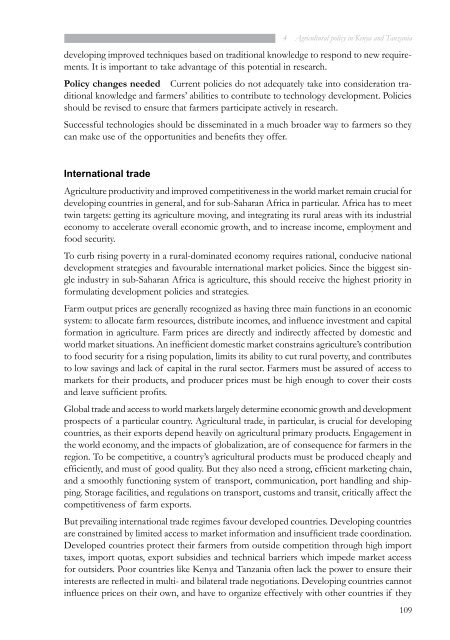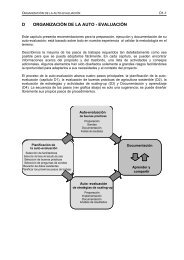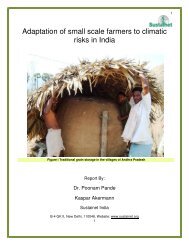cases from tanzania - Sustainet
cases from tanzania - Sustainet
cases from tanzania - Sustainet
Create successful ePaper yourself
Turn your PDF publications into a flip-book with our unique Google optimized e-Paper software.
4 Agricultural policy in Kenya and Tanzania<br />
developing improved techniques based on traditional knowledge to respond to new requirements.<br />
It is important to take advantage of this potential in research.<br />
Policy changes needed Current policies do not adequately take into consideration traditional<br />
knowledge and farmers’ abilities to contribute to technology development. Policies<br />
should be revised to ensure that farmers participate actively in research.<br />
Successful technologies should be disseminated in a much broader way to farmers so they<br />
can make use of the opportunities and benefits they offer.<br />
international trade<br />
Agriculture productivity and improved competitiveness in the world market remain crucial for<br />
developing countries in general, and for sub-Saharan Africa in particular. Africa has to meet<br />
twin targets: getting its agriculture moving, and integrating its rural areas with its industrial<br />
economy to accelerate overall economic growth, and to increase income, employment and<br />
food security.<br />
To curb rising poverty in a rural-dominated economy requires rational, conducive national<br />
development strategies and favourable international market policies. Since the biggest single<br />
industry in sub-Saharan Africa is agriculture, this should receive the highest priority in<br />
formulating development policies and strategies.<br />
Farm output prices are generally recognized as having three main functions in an economic<br />
system: to allocate farm resources, distribute incomes, and influence investment and capital<br />
formation in agriculture. Farm prices are directly and indirectly affected by domestic and<br />
world market situations. An inefficient domestic market constrains agriculture’s contribution<br />
to food security for a rising population, limits its ability to cut rural poverty, and contributes<br />
to low savings and lack of capital in the rural sector. Farmers must be assured of access to<br />
markets for their products, and producer prices must be high enough to cover their costs<br />
and leave sufficient profits.<br />
Global trade and access to world markets largely determine economic growth and development<br />
prospects of a particular country. Agricultural trade, in particular, is crucial for developing<br />
countries, as their exports depend heavily on agricultural primary products. Engagement in<br />
the world economy, and the impacts of globalization, are of consequence for farmers in the<br />
region. To be competitive, a country’s agricultural products must be produced cheaply and<br />
efficiently, and must of good quality. But they also need a strong, efficient marketing chain,<br />
and a smoothly functioning system of transport, communication, port handling and shipping.<br />
Storage facilities, and regulations on transport, customs and transit, critically affect the<br />
competitiveness of farm exports.<br />
But prevailing international trade regimes favour developed countries. Developing countries<br />
are constrained by limited access to market information and insufficient trade coordination.<br />
Developed countries protect their farmers <strong>from</strong> outside competition through high import<br />
taxes, import quotas, export subsidies and technical barriers which impede market access<br />
for outsiders. Poor countries like Kenya and Tanzania often lack the power to ensure their<br />
interests are reflected in multi- and bilateral trade negotiations. Developing countries cannot<br />
influence prices on their own, and have to organize effectively with other countries if they<br />
109




